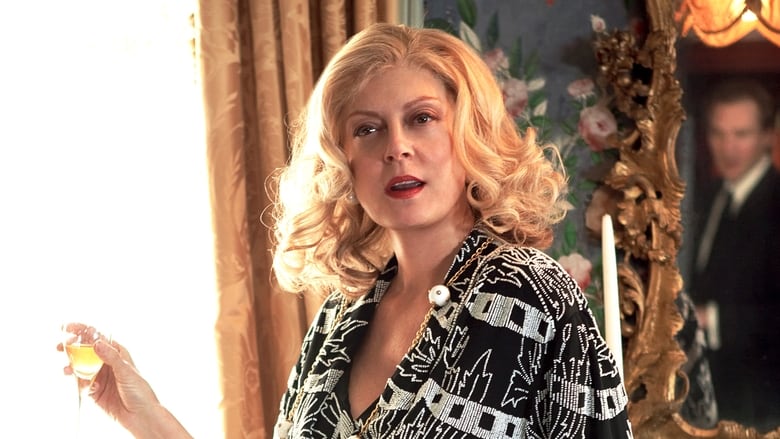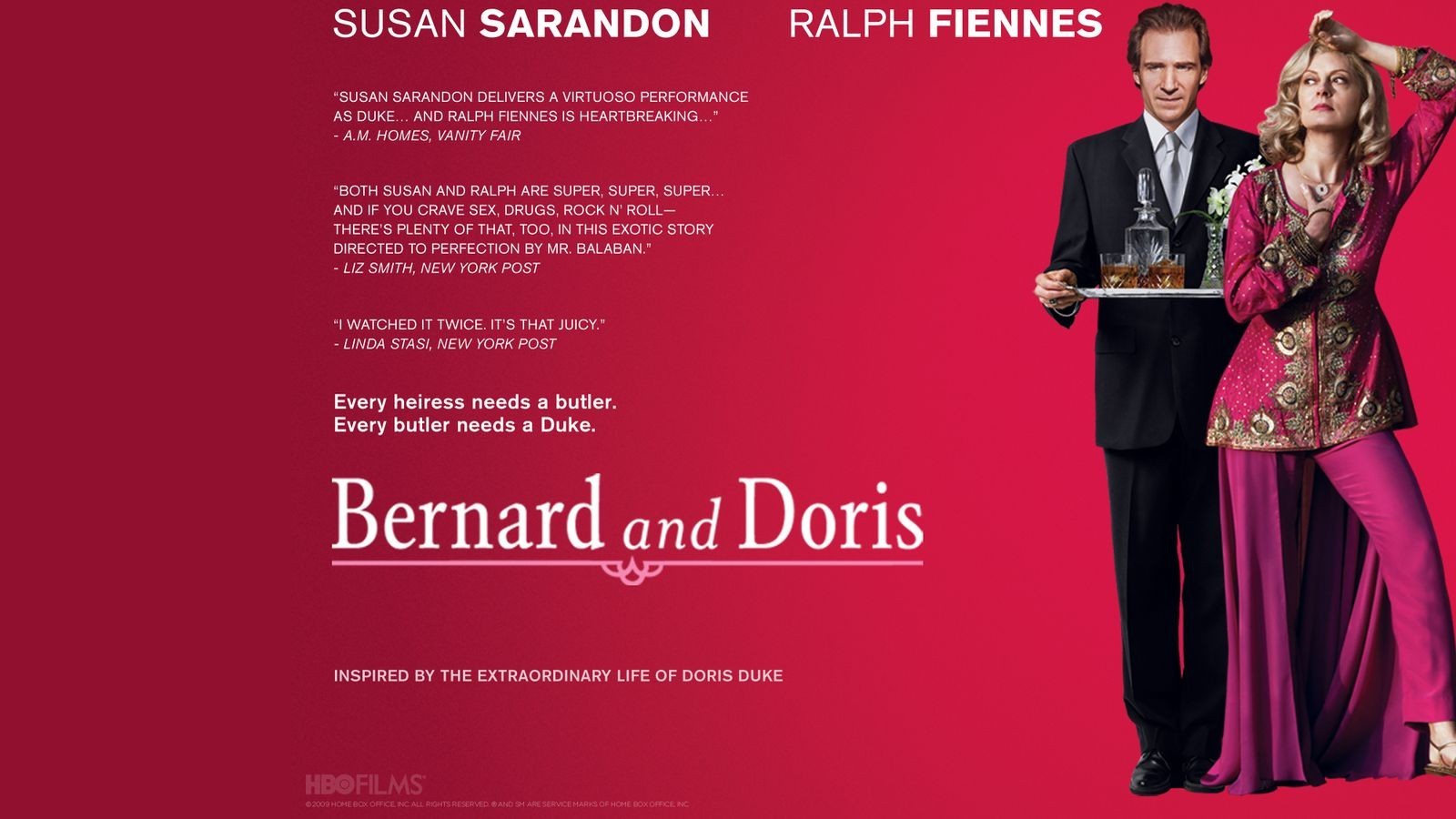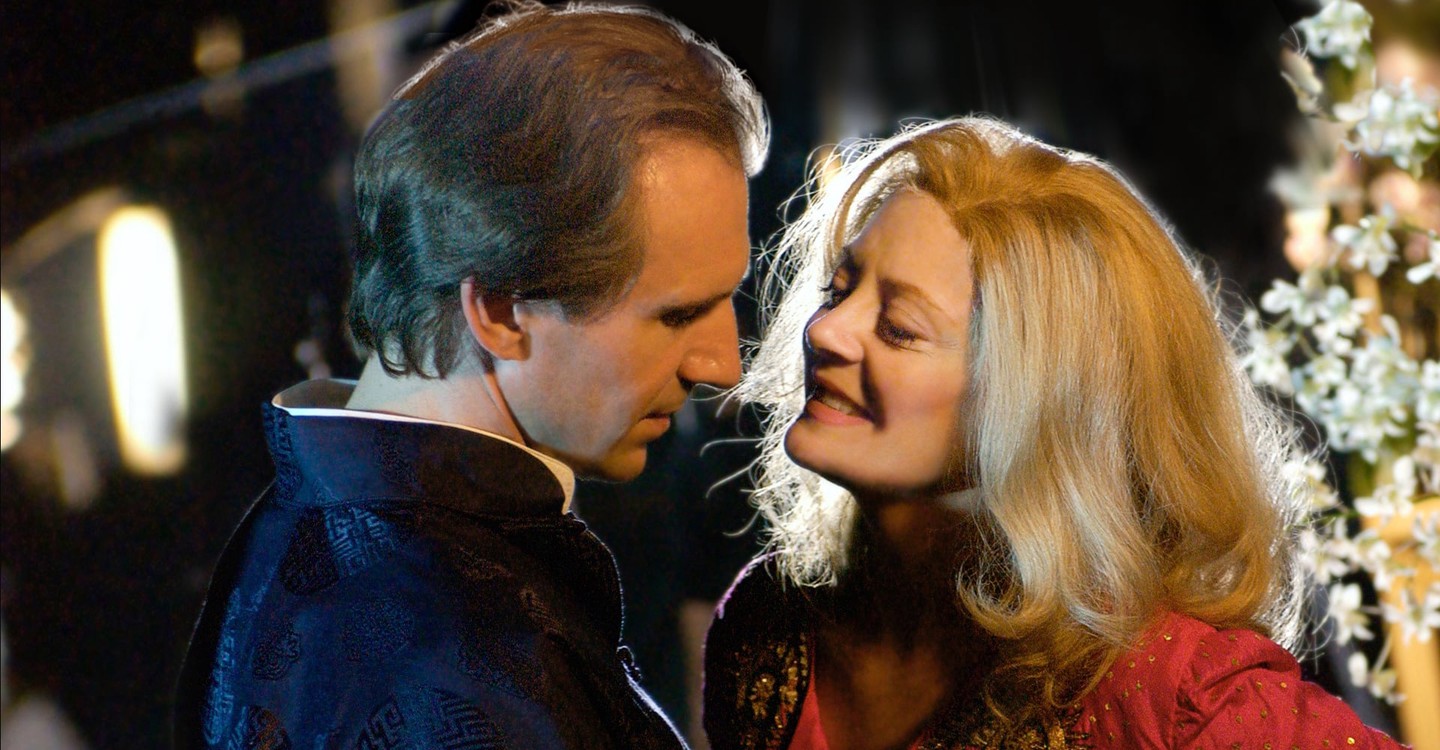← Back to Reviews

in
Bernard and Doris
HBO triumphed with a lavishly mounted movie called Bernard and Doris that recalls the relationship between tobacco millionairess Doris Duke and her gay butler, Bernard Lafferty, who upon Duke's death, became the executor of her estate. . We are warned before the opening credits roll that some of what we're about to see is based on fact and that some of it is not...whatever that means.

The 2006 movie opens with the very wealthy Doris Duke (Oscar winner Susan Sarandon) firing her current butler because the cantaloupe he served her was cold. We then observe Bernard Lafferty (Ralph Fiennes) arrive on the estate in a run down economy car to interview for the job. Bernard is a former butler to Elizabeth Taylor and Peggy Lee and is also an alcoholic, fresh from six months in rehab. As he begins working for Ms. Duke, the only rule in the house is that he doesn't drink her liquor. This is the beginning of en employee/employer relationship that turns into an unconventional friendship that Duke and Lafferty don't see coming, but the viewer does immediately.

Show business veteran and Christopher Guest rep company member Bob Balaban deserves the lion's credit for bringing a gloss and dash of originality to a story that isn't terribly original, as anyone who has seen the 1989 Best Picture Driving Miss Daisy can attest, but it's Balaban's technique in telling the story that makes a lot of what goes on here very entertaining and keeps it surprisingly economic. Loved the way Doris Duke's backstory is laid out for the viewer through newspaper clippings that frame the opening credits. Balaban reveals backstory for Bernard without the use of dialogue as well. We don't learn that he's an alcoholic until about fifteen minutes in when he's observed emptying a flask into the bathroom sink and we don't learn that he's gay until he is caught in a private moment at Doris' dressing table trying on her jewelry.

Hugh Costello's intelligent screenplay effectively crafts a relationship between two very different people who we know are very different, but what I loved here is the fact that the principals at the beginning of the movie are the same people at the end of the movie. Doris never apologizes for being a hard drinking, pill popping, party gal who has affairs with decades younger piano players and Bernard's dedication to his job that he puts way above having any kind of personal job is admirable and also a little sad. I do love that little scene near the beginning of the film where he is talking to the rest of Ms. Duke's staff about how they better fall in line. I also enjoyed the fact that this Doris Duke enjoyed her wealth, never flaunted it or got in people's faces with it.

HBO and Balaban spared no expense in bringing this elegant story to the screen featuring breathtaking art direction/set direction, lush music, and some stunning costumes. As always, Susan Sarandon offers another polished powerhouse turn as Doris Duke that might initially remind viewers of Faye Dunaway in Mommie Dearest, but Sarandon brings a humanity to this character than Dunaway never brought to Joan Crawford and Feinnes is sophistication personified as the sensitive Bernard. I love the scene near the end of the film with a dying Doris and Bernard discussing Doris' funeral arrangements where he is wearing one of her dresses and a pair of her earrings. Sarandon, Feinnes, and Balaban all received richly deserved Emmy and Golden Globe nominations for their work here. There's also a solid supporting turn from the late James Rebhorn as Duke's lawyer, who becomes a completely hissable villain before the credits roll. A deliciously sophisticated story whose basis in fact probably amps its appeal.
HBO triumphed with a lavishly mounted movie called Bernard and Doris that recalls the relationship between tobacco millionairess Doris Duke and her gay butler, Bernard Lafferty, who upon Duke's death, became the executor of her estate. . We are warned before the opening credits roll that some of what we're about to see is based on fact and that some of it is not...whatever that means.

The 2006 movie opens with the very wealthy Doris Duke (Oscar winner Susan Sarandon) firing her current butler because the cantaloupe he served her was cold. We then observe Bernard Lafferty (Ralph Fiennes) arrive on the estate in a run down economy car to interview for the job. Bernard is a former butler to Elizabeth Taylor and Peggy Lee and is also an alcoholic, fresh from six months in rehab. As he begins working for Ms. Duke, the only rule in the house is that he doesn't drink her liquor. This is the beginning of en employee/employer relationship that turns into an unconventional friendship that Duke and Lafferty don't see coming, but the viewer does immediately.

Show business veteran and Christopher Guest rep company member Bob Balaban deserves the lion's credit for bringing a gloss and dash of originality to a story that isn't terribly original, as anyone who has seen the 1989 Best Picture Driving Miss Daisy can attest, but it's Balaban's technique in telling the story that makes a lot of what goes on here very entertaining and keeps it surprisingly economic. Loved the way Doris Duke's backstory is laid out for the viewer through newspaper clippings that frame the opening credits. Balaban reveals backstory for Bernard without the use of dialogue as well. We don't learn that he's an alcoholic until about fifteen minutes in when he's observed emptying a flask into the bathroom sink and we don't learn that he's gay until he is caught in a private moment at Doris' dressing table trying on her jewelry.

Hugh Costello's intelligent screenplay effectively crafts a relationship between two very different people who we know are very different, but what I loved here is the fact that the principals at the beginning of the movie are the same people at the end of the movie. Doris never apologizes for being a hard drinking, pill popping, party gal who has affairs with decades younger piano players and Bernard's dedication to his job that he puts way above having any kind of personal job is admirable and also a little sad. I do love that little scene near the beginning of the film where he is talking to the rest of Ms. Duke's staff about how they better fall in line. I also enjoyed the fact that this Doris Duke enjoyed her wealth, never flaunted it or got in people's faces with it.

HBO and Balaban spared no expense in bringing this elegant story to the screen featuring breathtaking art direction/set direction, lush music, and some stunning costumes. As always, Susan Sarandon offers another polished powerhouse turn as Doris Duke that might initially remind viewers of Faye Dunaway in Mommie Dearest, but Sarandon brings a humanity to this character than Dunaway never brought to Joan Crawford and Feinnes is sophistication personified as the sensitive Bernard. I love the scene near the end of the film with a dying Doris and Bernard discussing Doris' funeral arrangements where he is wearing one of her dresses and a pair of her earrings. Sarandon, Feinnes, and Balaban all received richly deserved Emmy and Golden Globe nominations for their work here. There's also a solid supporting turn from the late James Rebhorn as Duke's lawyer, who becomes a completely hissable villain before the credits roll. A deliciously sophisticated story whose basis in fact probably amps its appeal.
